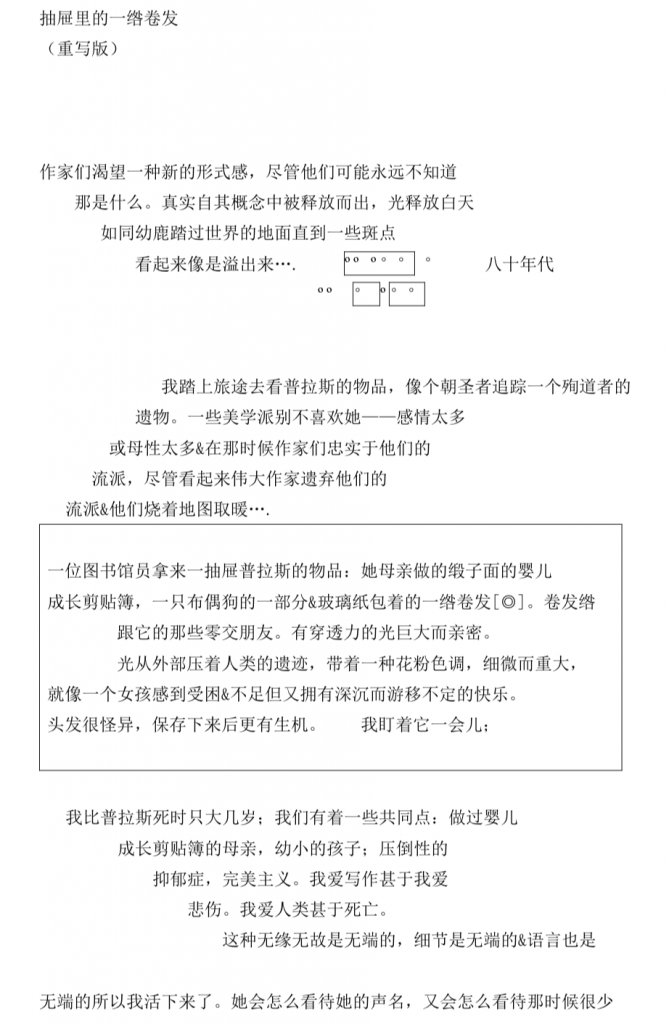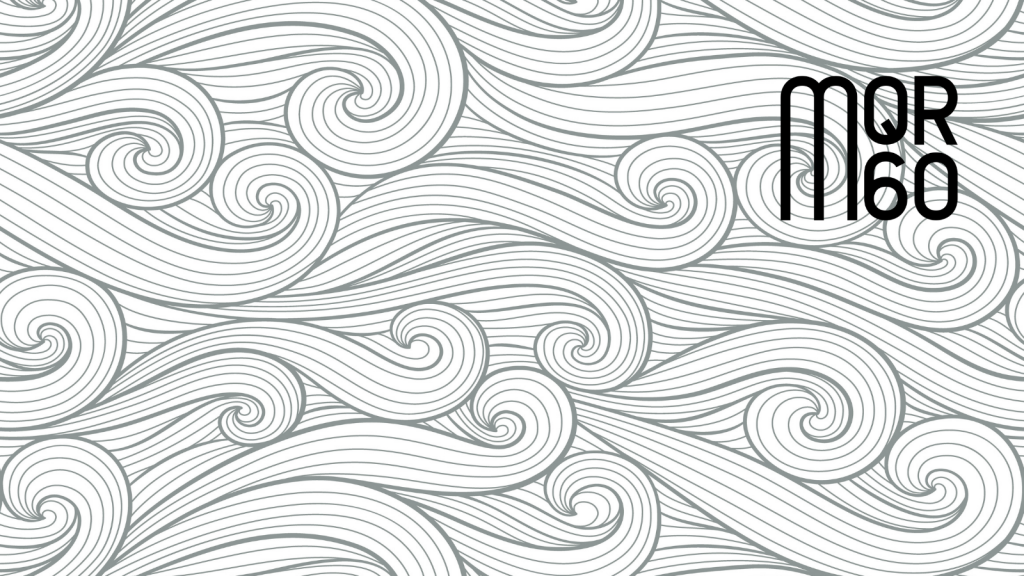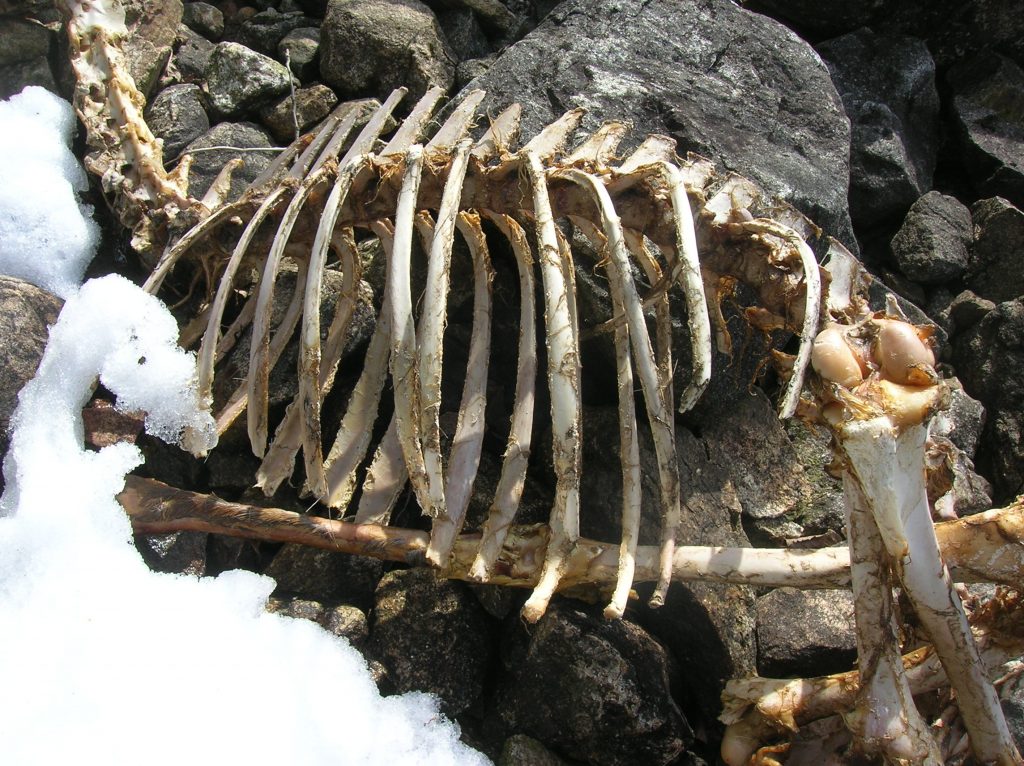Brenda Hillman introduces her poem “Plath’s Hair,” her 2018 revision of the poem “A Curl of Hair in a Drawer,” and the translation of “A Curl of Hair in a Drawer” into the Chinese by Jami Proctor Xu and Zhou Zan.”Plath’s Hair” first appeared in the pages of MQR more than 30 years ago.
Like many poets, I have sometimes over time written several different poems about the same experience. These two poems are examples of that. Ostensibly spurred by thinking about Sylvia Plath and her influence, the two pieces were written nearly twenty years apart. The second poem somewhat cannibalizes the first poem, but they are different experiences of consciousness that emerged from two slanted forms of the same memory, and hence are in divergent styles. “Plath’s Hair” was written in the late 1980s soon after visiting the trove of Sylvia Plath’s materials with Patricia Hampl at the University of Indiana library, especially the “baby book” her mother had kept. I scribbled notes after the visit, and drafted poems, including a longer version of the poem in “parts” with the Plath incident as a centerpiece, a poem I did not save—or perhaps I did, but I’m not sure where it is. At the time, I was caught up in reading about early gnosticism for the poems in Bright Existence and always on the lookout for examples of “trapped light,” a gnostic concept. My shock at seeing Plath’s small curl of young hair in the library archive had to do with how it was dull and bright at the same time. I tried to capture paradox in the 1990 poem. Larry Goldstein was editing the issue of Michigan Quarterly Review on the theme of “The Female Body” and asked me for a poem so I sent it to him; I did not reprint it in a book because I felt I had not found the form for the split between expectation and manifestation. I tinkered with rewriting over the years/decades. My memory of the visit added odd layers, and the relevance of Plath as a figure in women’s writing also shifted as I thought about what was “daring” in innovative writing. The box is a visual representation of the drawer and several experiences I had shared with Plath—of depression, of having a mother who kept a book, and of thinking about archives and interiorities. I feel I captured the experience in “shingled” stages. It appears my book, Extra Hidden Life, among the Days. I am also grateful to poet and translator Jami Proctor Xu who asked me to submit something for a collection that she and poet Zhou Zan were working on to introduce poems on Plath to Chinese readers in 2016 and I am grateful to them, as well as to the Michigan Quarterly Review for printing the first version of the piece.
-Brenda Hillman, November 2020
PLATH’S HAIR (1990)
for Patricia Hampl
Forced goldenness. The business of gold being much too bright so it hardly seems to belong in this century. Today that gold comes down a mountainside, arrives at the powdery wings of a butterfly picked up on a hike, stops when it comes to the singed black edges of the wings and enters the whine of a mosquito— and I am still haunted by the curl of her hair, how far outside the other world it seemed that day in the library when we opened the satin-covered baby book, thumbed through the pages printed by a mother who cared too much and in the wrong way. There was the record of gifts, the destroyed stuffed dog, and suddenly, beside the weakened strands of a snuggly knit cap one small curl of the hair, swirling in its tight, endless vortex— What surprised us was how dull, how absolute it was, how light seemed to be left out, but just around the edges, there was too much gold as though light were trying to get in, apologize, or make it better— The librarian snapped her box of cards… and I think we were mildly disappointed, as the ancient pilgrims must have been, not really wanting to see the relics of the saints, having traveled all that way to see them with the servants who would spread out picnics by the graves... What part of earth can hold the meaning we assign it? It must have been the cellophane that made the little curl of hair take that rim of light into itself, trying to accrue some existence, to take on something extra from outside. Hair never quite lives, does it? But in the planned dead monument, the glint survives—
CURL OF HAIR IN A DRAWER (2018)
(a revision)

“Curl of Hair in a Drawer” from Extra Hidden Life, among the Days © 2018 by Brenda Hillman. Published by Wesleyan University Press and used with permission.
CURL OF HAIR IN A DRAWER
Translated by:
Jami Proctor Xu and Zhou Zan
徐贞敏 周瓒

To read more pieces from the MQR archives you can purchase the Winter 2021 Anniversary Issue here.



